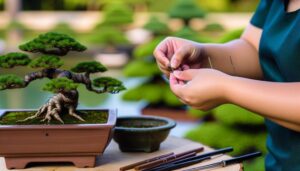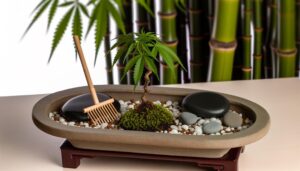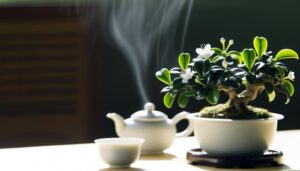Creating Good Feng Shui Energy with Bonsai Plants
Yes, bonsai plants are considered excellent for Feng Shui. They symbolize harmony, balance, and patience, promoting the flow of positive Chi.
By preventing energy stagnation, bonsais enhance well-being and create a nurturing atmosphere in the home. These miniature trees embody the natural balance of yin and yang, fostering a serene and productive environment.
Properly selecting and placing resilient species, such as Ficus or Chinese Elm, optimizes spatial dynamics and energy flow. For those seeking to cultivate a tranquil and harmonious living space, the thoughtful inclusion of bonsai is a powerful practice worth considering.
Discover more about their Feng Shui potential.
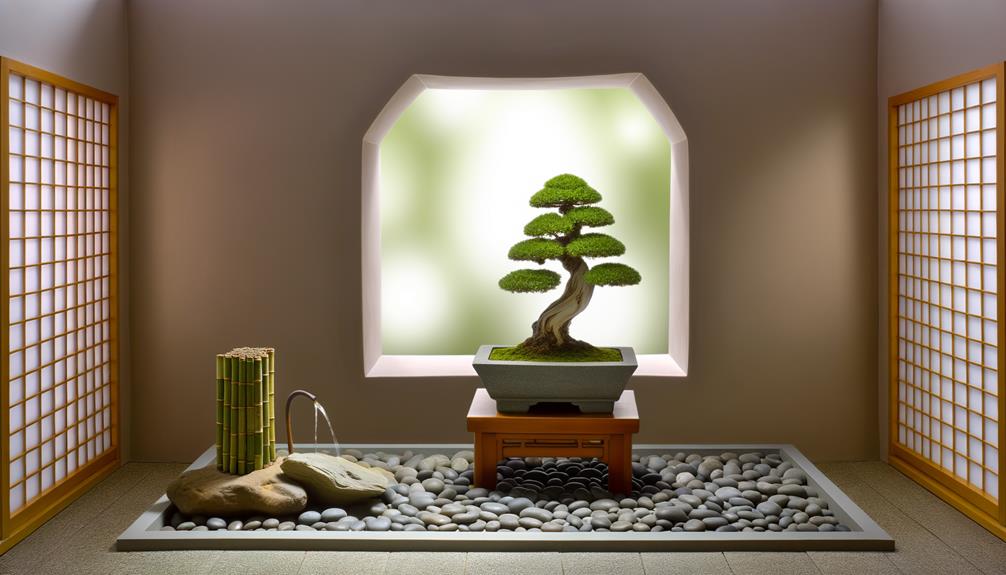
Key Takeaways
- Bonsai plants symbolize harmony, balance, and patience, aligning with Feng Shui principles.
- Strategically placed bonsai optimize spatial dynamics and improve energy flow.
- Bonsai prevent energy stagnation and promote overall well-being in indoor spaces.
- They embody a balance of yin and yang energies, enhancing tranquility.
- Regular care of bonsai fosters a meditative practice, furthering positive Chi.
Understanding Feng Shui
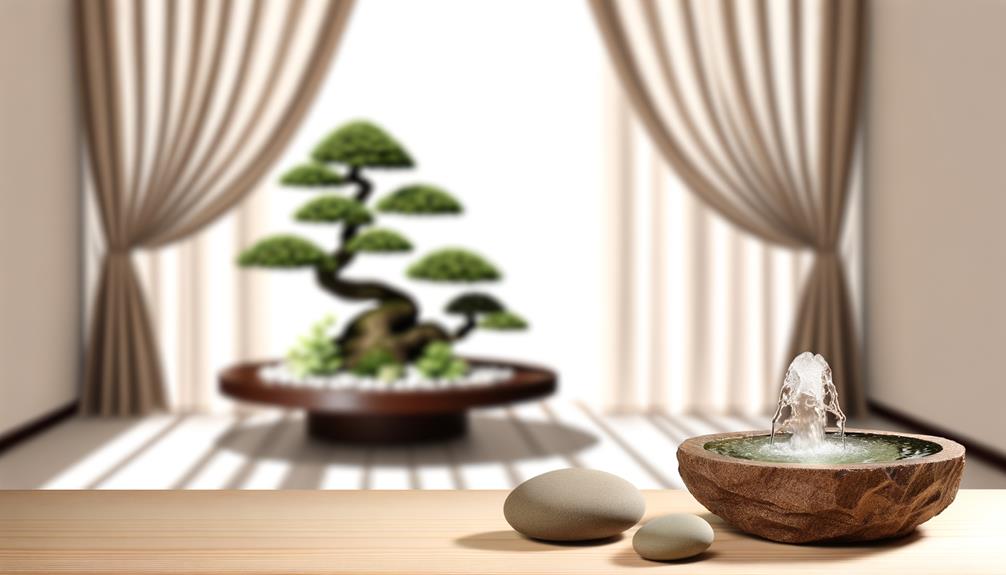
Understanding Feng Shui involves delving into the ancient Chinese practice that harmonizes individuals with their surrounding environment through the strategic arrangement of objects and spaces.
Originating over 3,000 years ago, Feng Shui is based on the belief that spatial orientation and physical elements influence the flow of chi, or life energy, impacting well-being, prosperity, and health.
This practice considers factors such as the five elements (wood, fire, earth, metal, and water), the Bagua map, and the principles of yin and yang.
By aligning these elements correctly, one can enhance energy flow and create a balanced, harmonious living or working space.
This holistic approach underscores the interconnectedness between humans and their environment, emphasizing the importance of intentional design.
The Role of Plants
In Feng Shui, plants play a crucial role in regulating energy flow and fostering harmony within a space.
Bonsai plants, in particular, are highly valued for their ability to enhance positive Chi, creating a balanced and tranquil environment.
Their presence not only beautifies interiors but also serves as a potent symbol of growth and robustness.
Plants and Energy Flow
How do bonsai plants influence the energy flow within a space, and what role do they play in the principles of Feng Shui?
Bonsai plants act as conduits of life force energy, known as 'chi' in Feng Shui. These miniature trees symbolize harmony, balance, and patience, essential for creating a serene environment.
The meticulously cultivated forms of bonsai embody natural elements in a controlled space, guiding the movement of energy and preventing stagnation. Their presence can enhance the flow of positive energy, promoting a sense of well-being and tranquility.
Strategically placed, bonsai can counteract negative energy and optimize spatial dynamics, ensuring a balanced and harmonious living or working environment. Therefore, bonsai plants serve both aesthetic and energetic purposes in Feng Shui.
Enhancing Positive Chi
By carefully selecting and positioning plants, one can enhance the flow of positive chi, contributing to a harmonious and dynamic environment. Bonsai plants, with their intricate structure and meticulous care, are particularly effective in channeling energy. Placing bonsai in strategic locations can balance the five elements—wood, fire, earth, metal, and water—thereby enriching the surrounding chi. The table below highlights ideal placements and their benefits:
| Element | Placement | Benefit |
|---|---|---|
| Wood | East/Southeast | Growth and energy |
| Fire | South | Fame and acknowledgment |
| Earth | Northeast/Center | Stability and sustenance |
| Metal | West/Northwest | Clarity and productivity |
| Water | North | Career and possibilities |
Integrating these principles guarantees a balanced, energized living space.
Bonsai Plant Symbolism
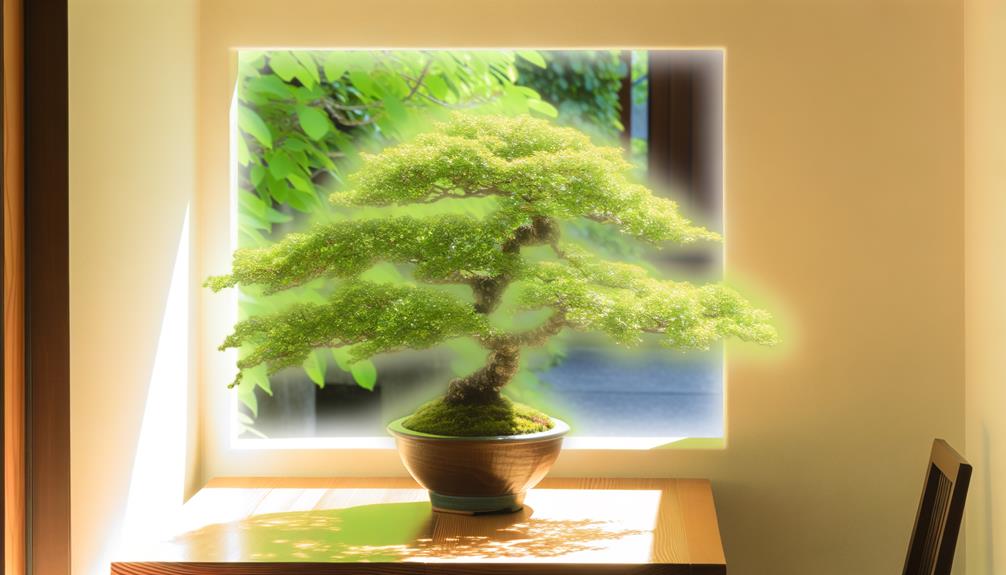
Often revered for their aesthetic elegance and intricate design, bonsai plants hold profound symbolic meanings in Feng Shui. Representing harmony, balance, and patience, these miniature trees encapsulate the natural world's elements in a confined space, echoing the principles of Yin and Yang.
Their meticulous cultivation reflects the harmony between human effort and natural growth, symbolizing longevity and perseverance. Moreover, bonsai are believed to attract positive energy, fostering a serene and contemplative environment. The presence of a well-cared-for bonsai can signify a life of continuous improvement and mindfulness, aligning with Feng Shui's goal of creating a balanced and harmonious living space.
Understanding these symbolic dimensions enhances one's appreciation and strategic placement of bonsai within their living or working areas.
Choosing the Right Bonsai
Selecting the appropriate bonsai is vital for harmonizing your space with Feng Shui principles. Beginners should consider species known for their resilience, while size and placement must align with the room's energy flow.
Additionally, understanding the symbolic meanings of different bonsai varieties can enhance their positive impact.
Species for Beginners
Choosing the right bonsai species as a beginner is essential for ensuring successful cultivation and fostering a fulfilling bonsai experience. Novices should consider hardy, low-maintenance species like the Ficus, Chinese Elm, and Juniper.
Ficus bonsai are particularly resilient, thriving in various conditions and forgiving of minor care mistakes. The Chinese Elm is another excellent choice, known for its adaptability and tolerance to pruning. Juniper bonsai, favored for their classic aesthetics, are robust and can be trained into various styles.
These species require less intricate care, making them ideal for those new to bonsai. By selecting these beginner-friendly species, enthusiasts can build confidence and develop their skills, laying a strong foundation for future bonsai endeavors.
Size and Placement
The size and placement of a bonsai plant are vital factors that greatly impact its growth, health, and overall aesthetic appeal. Selecting the right size guarantees the plant thrives in its designated environment. Larger bonsai require more space and light, making them suitable for spacious areas, while smaller bonsai fit well in compact spaces like desktops or shelves.
Proper placement also harmonizes the plant with its surroundings, promoting positive energy flow. Positioning a bonsai in an area with adequate light and air circulation is essential for its health. Additionally, avoid placing bonsai in high-traffic areas to prevent damage.
Thoughtful consideration of size and placement aligns the bonsai with Feng Shui principles, enhancing both its beauty and beneficial energies.
Symbolic Meanings
Understanding the symbolic meanings associated with different bonsai species is essential for making an informed choice that aligns with both personal intentions and Feng Shui principles. Each bonsai species carries unique symbolism; for example, the Juniper bonsai represents protection and resilience, making it suitable for warding off negative energy.
The Ficus bonsai is often associated with unity and abundance, ideal for fostering family harmony and prosperity. Meanwhile, the Cherry Blossom bonsai symbolizes renewal and fragility, reflecting the transient beauty of life. Selecting a bonsai that resonates with your specific goals can enhance the flow of positive energy in your space.
A well-chosen bonsai not only beautifies a room but also enriches the spiritual and emotional atmosphere.
Placement in the Home
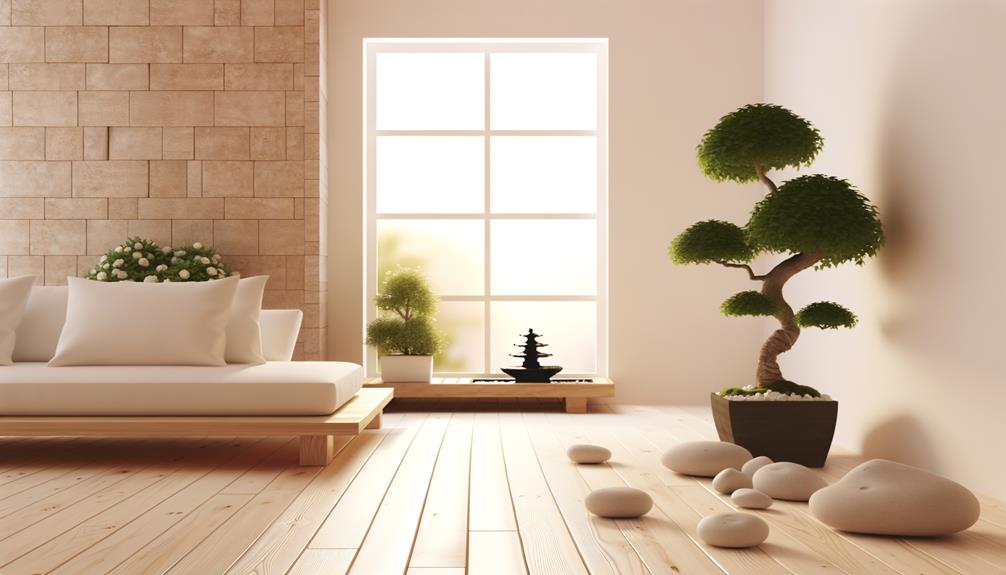
Strategically situating bonsai plants in your home can greatly enhance the flow of positive energy and harmony according to Feng Shui principles. Proper placement ensures that these miniature trees amplify beneficial chi and balance the surrounding environment.
Here are three key areas to contemplate:
- Living Room: Place a bonsai plant near a window with ample sunlight; this fosters growth and vitality, enriching social interactions.
- Home Office: Positioning a bonsai on your desk can stimulate creativity and help maintain focus, thereby boosting productivity.
- Entryway: Placing a bonsai near the entrance invites auspicious energy into your home, creating a welcoming atmosphere for guests and residents alike.
Thoughtful positioning not only enhances aesthetics but also aligns with the principles of Feng Shui.
Enhancing Positive Energy
Incorporating bonsai plants into your living spaces can elevate the positive energy, or chi, that permeates your environment. These miniature trees symbolize harmony, patience, and balance, essential elements in Feng Shui.
Positioning bonsai plants thoughtfully within your home can enhance the flow of beneficial energy, creating a serene and nurturing atmosphere. Their intricate forms and natural beauty invite mindfulness and tranquility, promoting a sense of well-being.
Bonsai are living entities that connect us to nature, grounding and stabilizing the energy in a space. The meticulous care required for bonsai cultivation fosters a meditative practice, further enriching the positive vibrations in your environment.
This synergy between nature and mindful living epitomizes the essence of Feng Shui.
Balancing Yin and Yang
In the practice of Feng Shui, bonsai plants are instrumental in balancing the Yin and Yang energies within a space. Their presence symbolizes natural harmony, enhancing the flow of positive energy and promoting tranquility indoors.
Strategically placing these miniature trees can create a serene environment conducive to both relaxation and productivity.
Symbolizing Natural Harmony
Bonsai plants are revered in Feng Shui for their ability to represent and balance the complementary forces of yin and yang, creating a sense of natural harmony within any space. This delicate equilibrium is achieved through the meticulous cultivation and shaping of the bonsai, which mirrors the balance found in nature.
Here are three ways bonsai plants symbolize natural harmony:
- Miniaturized Trees: Bonsai plants encapsulate the grandeur of nature in a small, manageable form, symbolizing the harmony between the vast and the minute.
- Balanced Elements: The interplay of wood (tree) and metal (container) in bonsai arrangements epitomizes the dynamic balance of yin and yang.
- Seasonal Changes: The transformation of bonsai plants through the seasons reflects the natural cycles and rhythms, fostering a deeper connection to natural harmony.
Enhancing Energy Flow
To enhance energy flow and balance the complementary forces of yin and yang, the strategic placement and care of bonsai plants play a crucial role in Feng Shui practice.
Properly positioned bonsai can harmonize the flow of chi, the essential life force, throughout a space. These miniature trees embody a balance of yin (passive, soft) and yang (active, hard) energies, creating a dynamic equilibrium.
Placement in areas where stagnation or imbalance is detected can rejuvenate the surrounding energy. The meticulous care required for bonsai—pruning, watering, and shaping—mirrors the attentive cultivation of balanced energy in one's environment.
Integrating bonsai into your space not only enhances aesthetic appeal but also fortifies the energetic harmony essential for a balanced life.
Promoting Tranquility Indoors
Strategically incorporating bonsai plants into indoor spaces can greatly promote tranquility by balancing the complementary forces of yin and yang. This harmonious integration creates a serene environment conducive to relaxation and mental clarity.
To effectively harness the calming effects of bonsai, consider the following:
- Placement: Position bonsai in areas requiring balance, such as living rooms or study areas, to harmonize energy flows.
- Selection: Choose bonsai species that align with desired energies; for example, ficus for stability (yang) and jade for calmness (yin).
- Maintenance: Regular care and pruning symbolize continuous growth and stability, enhancing the tranquil atmosphere.
Bonsai Care Tips
Proper care and maintenance of bonsai plants are necessary for their health and longevity, demanding a keen understanding of their specific needs. Consistent watering is essential; the soil should be kept moist but not waterlogged.
Positioning the bonsai in a location with adequate sunlight, yet shielded from extreme temperatures, is important. Regular pruning helps maintain the desired shape and encourages healthy growth.
Additionally, repotting every 2-3 years ensures that the roots have sufficient space and nutrients. Applying balanced fertilizers during the growing season supports robust development.
Monitoring for pests and diseases is also crucial, as early detection can prevent significant damage. With meticulous care, bonsai plants can thrive, serving as symbols of balance and harmony in your space.
Common Feng Shui Mistakes
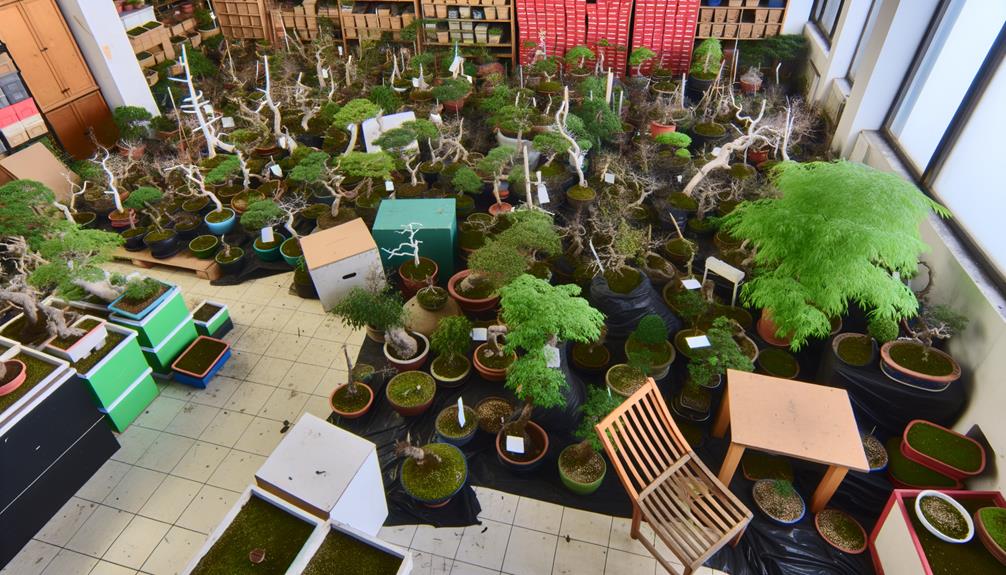
While meticulous care is essential for the health of bonsai plants, it is equally important to be aware of common Feng Shui mistakes that can hinder the positive energy they are meant to bring into your space.
Understanding and avoiding these errors can maximize the harmonious influence of your bonsai.
- Poor Placement: Placing your bonsai in areas with low energy flow, such as dark corners or cluttered spaces, can obstruct positive chi.
- Neglecting Plant Health: A neglected or dying bonsai plant can emit negative energy, counteracting Feng Shui benefits.
- Overcrowding: Overloading a space with too many plants or objects can disrupt energy balance, making it vital to maintain a well-organized environment.
Success Stories
Many individuals have experienced remarkable transformations in their living spaces by incorporating bonsai plants with mindful Feng Shui practices. These success stories highlight the profound impact that careful placement and attention to detail can have. For instance, a family in Tokyo reported increased harmony and reduced stress after placing a bonsai in their living room's wealth corner. Similarly, an entrepreneur in New York saw a noticeable boost in business after integrating a bonsai into her office setup.
| Location | Transformation | Outcome |
|---|---|---|
| Tokyo, Japan | Living room arrangement | Increased harmony, reduced stress |
| New York, USA | Office enhancement | Boost in business |
| London, UK | Bedroom placement | Improved sleep, well-being |
These examples underscore the potential of bonsai plants to create balanced, prosperous environments.
Expert Opinions
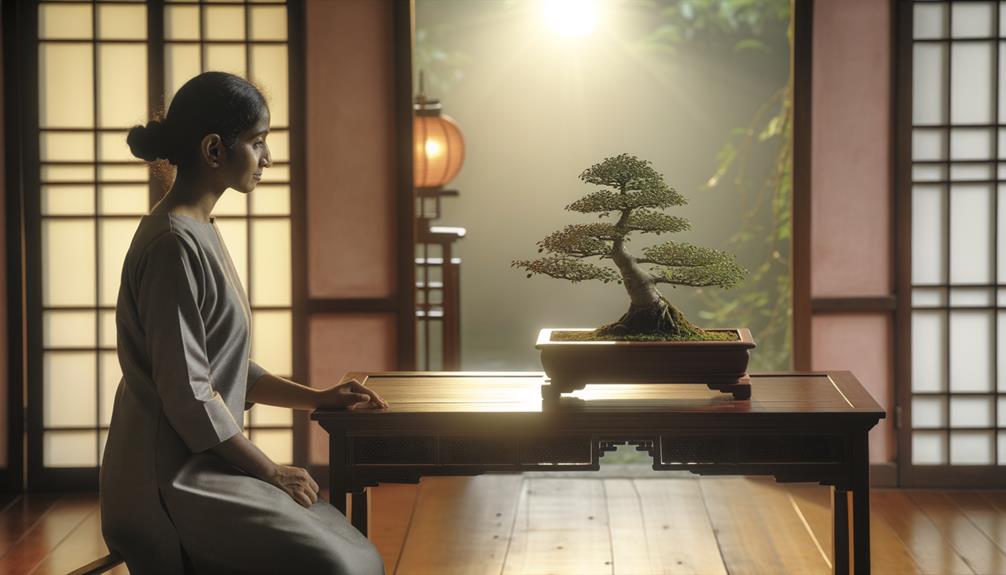
Building upon these inspiring success stories, renowned Feng Shui experts emphasize the significance of bonsai plants in fostering positive energy and balance within various spaces. Their insights underscore how bonsai plants can harmonize environments by enhancing the flow of chi, the essential life force.
Key expert recommendations include:
- Placement: Position bonsai in the East, South, or Southeast areas of your home to promote health, wealth, and family harmony.
- Maintenance: Regular care and pruning symbolize the continuous nurturing of personal growth and well-being.
- Selection: Choose species such as Jade, Ficus, or Pine, which are known for their auspicious qualities and resilience.
Such expert opinions highlight the profound impact of bonsai on enhancing the energetic dynamics of any space.
Conclusion
In the world of feng shui, bonsai plants can be a double-edged sword, embodying both harmony and imbalance depending on their placement and care.
The meticulous cultivation of bonsai reflects the essence of balance and tranquility, essential for positive energy flow.
However, improper positioning or neglect can turn this symbol of serenity into a harbinger of discord.
Therefore, understanding the nuanced principles of feng shui is paramount in harnessing the full potential of bonsai plants for a harmonious living space.


